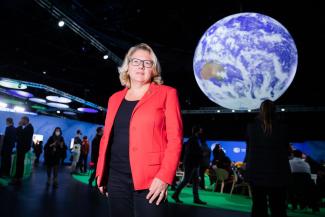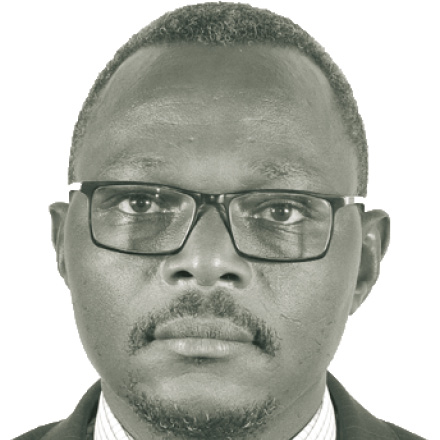New Federal Government
Several things to like

DIE director Anna-Katharina Hornidge considers Schulze a promising choice. The think tank leader appreciates the new minister’s international experience and involvement in sustainability issues. After all, she was the environment minister in the previous cabinet of Angela Merkel.
Hornidge also finds it reassuring that the Federal Ministry for Economic Cooperation and Development (BMZ) will not be merged with the Foreign Office or the Ministry of Defence, as some had proposed. Hornidge argues that the BMZ is geared towards global solidarity, and this orientation must not be diluted with concerns of diplomacy or security.
Hornidge finds several things to like in the new coalition agreement. For example, the term sustainability has made it into the headline “Mehr Fortschritt wagen – Bündnis für Freiheit, Solidarität und Nachhaltigkeit” (Daring more progress – alliance for freedom, solidarity and sustainability). The scholar adds that climate awareness permeates the agreement, which is a good start, even though other dimensions of sustainability are not emphasised as much.
Values-based multilateralism
The development scholar appreciates that the new coalition is committed to a values-based foreign policy with a strong focus on multilateralism. The principles of democracy, human rights and diversity are coherently endorsed throughout the agreement, she says, with both the Sustainable Development Goals and the Paris Climate Goals serving as points of reference. Obviously, it remains to be seen how this will translate into tangible policy-making. The DIE has a long history of endorsing both sustainable development and multilateral policymaking (see Hans Dembowski on our D+C/E+Z platform).
According to the coalition agreement, Germany will keep its expenditure for official development assistance (ODA) above 0.7 % of gross national income, with 0.2 % earmarked for least-developed countries. That means that either other countries will get less support or ODA must increase, Hornidge points out. The new government also states that climate finance is additional to ODA, but Hornidge admits that it is not clear how things will play out.
The DIE is a tax-funded think tank. As a tenured professor of Bonn University, Hornidge nonetheless enjoys full academic independence. Her deputy at the DIE is Imme Scholz, who is not related to the new chancellor, and will soon move on to lead the Heinrich Böll Foundation, which is close to the Greens. (Full disclosure: She is also a member of D+C/E+Z’s advisory board.)
International cooperation
Policy coherence is difficult to achieve for any government, Scholz says. Germany’s new federal government would do well to adopt a cross-departmental foreign strategy. That would help to coordinate policy-making within the EU, and it would also be useful in regard to development cooperation. Scholz argues that climate partnerships with developing countries are promising, and could be linked to the European Green Deal.
Scholz praises the coalition agreement for its evidence-based approach. Not only development efforts abroad, but military missions too will be evaluated. Further good intentions, according to her, include gender justice, international action against tax evasion and support for a new international regime for dealing with sovereign default.
Scholz points out that most federal ministries are involved in some kind of cross-border cooperation, but only the Foreign Office and the BMZ have specialists with a deep understanding of foreign nations. She stresses that international affairs must be handled with great sensitivity. While authoritarian governments must hear clear statements regarding democracy and human rights, cooperation on issues such as climate and biodiversity must not be jeopardised, she argues.
DIE director Hornidge hopes the new government will focus on issues related to sustainability, which is not a special interest issue. Since appreciation of science provides a good basis for multilateral policy-making, she says, German support for building of scientific capacities in low- and middle-income countries can help to achieve results. Respect for facts, she adds, is closely related to respect for democracy.
Hans Dembowski is editor in chief of D+C Development and Cooperation / E+Z Entwicklung und Zusammenarbeit.
euz.editor@dandc.eu














